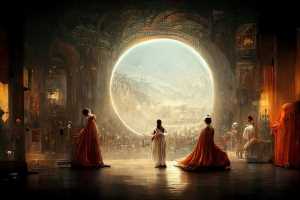Global stir after AI art-win prompts changes at Colorado State Fair
After Pueblo-based designer Jason Allen used the artificial intelligence software Midjourney to help create the sci-fi-tinged “Théâtre D’opéra Spatial” last year, the art world took notice.
The twist? Judges for the Colorado State Fair’s annual art competition didn’t learn about Allen’s use of AI until after the piece had won the Blue Ribbon in the amateur division of the digital art category last September. This time around — the fair wraps up its two-week run on Monday, Sept. 4 — the rules will be a little different. Artists will be required to say whether they are using AI.
“Last year was new to us, and new to the world,” said Scott Stoller, general manager of the 151-year-old fair. “We got to be ground zero for that debate, because it’s a much bigger dialogue than the state fair, and an emerging issue in the art world.”
Allen said he made his use of AI clear when he submitted his work. But either way, the win created a global stir that has yet to settle. Artists, critics and news media — including The New York Times and The Smithsonian — have over the last 12 months used the painting to explore the ethical and copyright issues around AI art, and its “machine-learning” from existing copyrighted works. Some have criticized AI artists, including Allen, as digital opportunists and thieves.
Last week, the subject got renewed attention when a U.S. District Court in Washington, D.C., decided that AI-generated art could not be copyrighted, ostensibly setting a precedent for future cases on the subject. (The case concerned Stephen Thaler and his AI-generated image made with the Creativity Machine algorithm).
This year’s State Fair rule changes are intended to give judges all the information they need, Stoller said, such as disclosing the media artists use in traditional paintings, like acrylic paints, and whether or not they used AI capabilities in software such as Adobe Photoshop.
“I get where the (State Fair) is coming from,” Allen said. “But this has always happened in all art movements, that there needs to be special clarification for anything challenging the status quo.
“It was the decision they made in order to keep AI art eligible for inclusion in the digital category, and in the competition as a whole,” he continued. “So I asked them, ‘What is the purpose of having this knowledge?’ And they said, ‘Well, so judges can be informed whether or not you used AI to produce it.’ That is the wrong answer. You’re literally just saying we’re putting a discriminatory mark on their artwork before it can even be judged.”
It didn’t stop Allen, a game designer by trade, from submitting another piece in 2023, though. This one, called “Grand Finale,” was created with the help of AI software and was placed in the digital competition. Allen took things up a notch, too, by giving it the appearance of a framed, physical work. It was also printed and given a surface patina to make its canvas look painted. “Grand Finale” was awarded the select professional artist award from the Pueblo Arts Alliance.
Allen has used his notoriety over the past year to launch a new AI art company and speak at symposiums and conferences about AI, including an upcoming visit to the headquarters of UNESCO (United Nations Educational, Scientific and Cultural Organization) in Paris on Sept. 7 for a 15-minute presentation titled “AI Alchemy.”
He has also been twice denied protection for his artwork by the U.S. Copyright Office, which attributed its decision to a lack of human authorship. Allen and his lawyer are in the process of a second appeal, with a decision expected in November, he said.
In Pueblo, though, it’s clear that Allen has generated increased attention for the fair’s art competition, Stoller said, with intrigue and conversations swirling around the displays.
“Our art show has been around for a century, and didn’t used to include digital art at all,” Stoller said. “AI art has only been (at the fair) for two years, and digital art for a couple decades. Who knows what’s next? The fair will have to make its way toward who to incorporate or exclude.
“If AI grows, like digital art, then it will become its own category of competition,” he added. “But right now, we don’t have enough entries to warrant it.”
Subscribe to our weekly newsletter, In The Know, to get entertainment news sent straight to your inbox.
Source: Read Full Article



